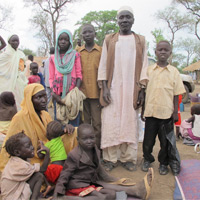
For over a year, the government of Sudan, led by alleged genocidaire President Omar al-Bashir, has denied international humanitarian aid organizations access to the states of South Kordofan and Blue Nile, in which a coalition of armed opposition groups, known as the Sudan Revolutionary Front, or SRF, has been fighting against government forces. Simultaneously, President Bashir’s regime has been purposefully targeting civilian populations, indiscriminately bombing farmland and villages and systematically destroying civilian property. The result: a humanitarian crisis comparable to that seen today in Syria and, less than a decade ago, in the Sudanese region of Darfur.
The United Nations estimates that nearly 700,000 civilians are internally displaced or severely affected by the conflicts in South Kordofan and Blue Nile. Of this number, it is thought that as many as 400,000 civilians may be located in areas controlled by the Sudan People’s Liberation Movement-North, or SPLM-N, an armed component of the SRF. Up to today, the Bashir regime remains steadfast in its absolute obstruction of international aid delivery to SPLM-N-controlled areas, leaving civilians there without access to desperately needed food and medical supplies. Meanwhile, almost a quarter of a million more Sudanese have fled the two states for neighboring South Sudan or Ethiopia.
The international community’s reaction, while more vigorous as of late, has proven entirely inadequate in terms of ensuring the delivery of vital humanitarian aid to civilians in South Kordofan and Blue Nile, particularly those civilians in SPLM-N-controlled areas. Initially, the international community used diplomatic pressure in an attempt to persuade Bashir to permit humanitarian aid workers into the two states. When that failed, the United Nations, the African Union, and the League of Arab States, in February 2012, jointly proposed the so-called “Tripartite Proposal” for the delivery of international humanitarian aid to the two states. The SPLM-N immediately accepted the proposal, which provided for the initiation of steps to deliver necessary aid to populations in government and SPLM-N controlled areas. The government of Sudan, on the other hand, made promises to review the proposal, a stalling tactic it maintained throughout the remainder of the local dry season, which ended in June. The onset of rains in Sudan means limited overland accessibility to South Kordofan and Blue Nile until at least October, effectively ensuring that any agreement securing aid delivery concluded in the interim cannot be fully realized until that time.
In the face of the Khartoum regime’s continuing delays in implementing the Tripartite Proposal, coupled with mounting concerns over deteriorating relations between Sudan and South Sudan, the U.N. Security Council, on May 2, 2012, adopted Resolution 2046. The resolution calls for, among other things, the government of Sudan to accept the Tripartite Proposal. Thereafter, in August, the Sudanese government signed a memorandum of understanding, or MOU, with the U.N., the African Union, and the League of Arab States providing for the development and implementation of an action plan related to the delivery of humanitarian aid throughout the two states. The MOU contained a one-week deadline for the development of the plan, which came and went without any action on the part of the government of Sudan. Indeed, today, over a month after the conclusion of the MOU, there is still no international aid reaching civilians in SPLM-N-controlled areas of South Kordofan and Blue Nile.

